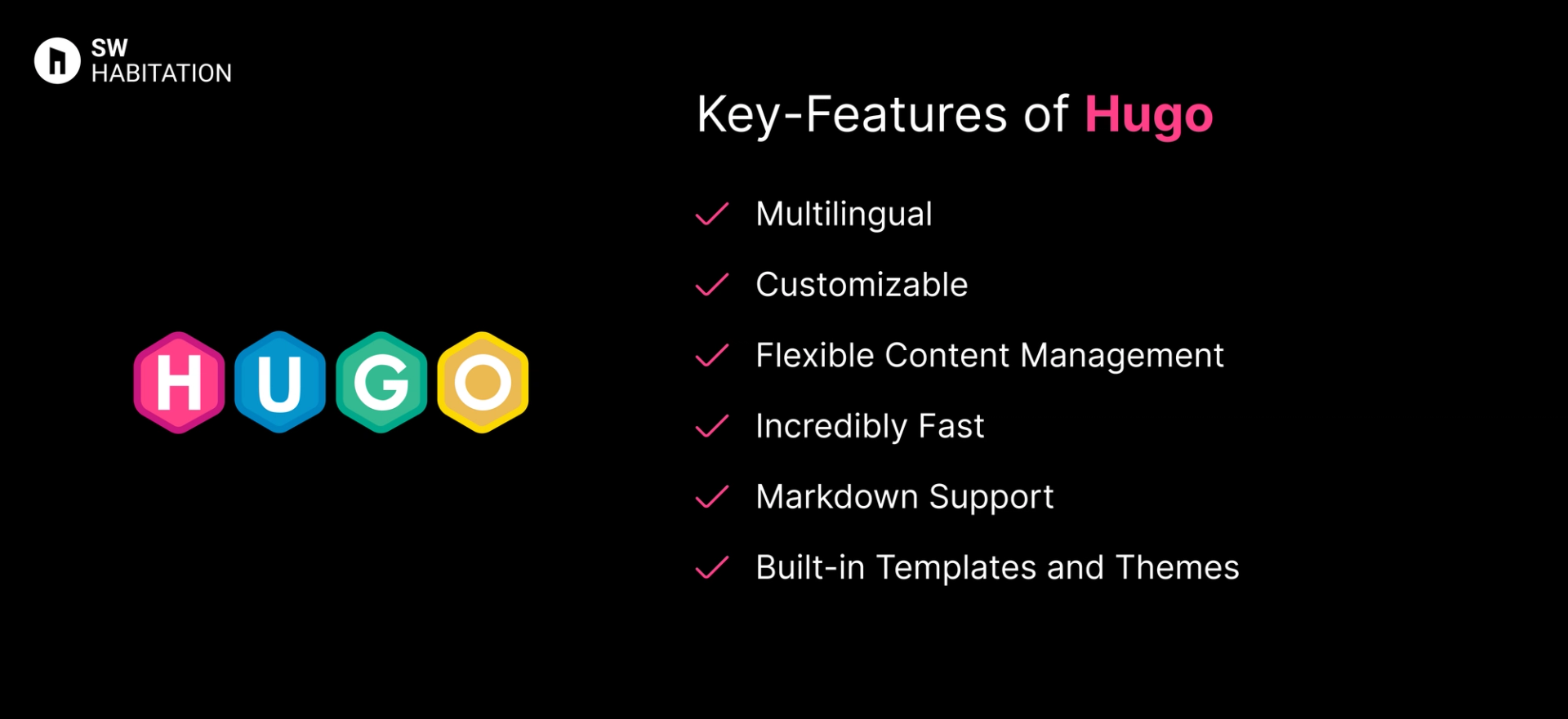Gatsby vs. Hugo

Gatsby

Hugo
Have you ever been to a website that loads super fast? Chances are it uses an SSG (Static Site Generator). It’s a tool that builds your site ahead of time, so when someone visits, they get the page instantly. No waiting around for things to load it’s just there.
What is Gatsby?
Gatsby is a React-based static site generator that combines the best of modern web development just like GraphQL, fast performance, and a rich plugin ecosystem to help you build static websites that feel dynamic.
It pulls in data from almost any source (APIs, CMSs, Markdown files) and serves it as blazing-fast static pages.
Key Features of Gatsby


- Optimized Performance: Automatically optimizes images and code splitting.
- Rich Plugin Ecosystem: Extend functionality effortlessly with plugins.
- SEO-Friendly: Pre-renders pages for great search engine optimization.
- PWA Support: Turn your site into a Progressive Web App with ease.
- GraphQL Data Layer: Fetch data from multiple sources seamlessly.
- Hot Reloading: Instant feedback during development.
- React-Powered: Leverages React for building UI components.
Advantages of Gatsby
- Great for Complex Sites: Handles large datasets and complex content structures well.
- Thriving Ecosystem: Tons of plugins and themes to speed up development.
- Data Agnostic: Pull data from anywhere — headless CMSs, APIs, or Markdown.
- Fast Performance: Optimizes everything out of the box.
- React Integration: Perfect if you’re already familiar with React.
Disadvantages of Gatsby
- Overkill for Simple Sites: Might be too much if all you need is a basic static site.
- Build Times: Can get slow with very large datasets.
- Learning Curve: Requires knowledge of React and GraphQL.
What is Hugo?
Hugo is an open-source static site generator written in Go. It’s famous for its speed, being one of the fastest generators available, even with large websites.
Hugo uses Markdown files for content and allows you to customize your site with themes and templates. It’s simple, powerful, and perfect for those who want quick deployment with minimal setup.
Key Features of Hugo


- Multilingual: Easy setup for multi-language websites.
- Customizable: Plenty of configuration options to meet your needs.
- Flexible Content Management: Supports pages, posts, and taxonomies like tags and categories.
- Incredibly Fast: Hugo can generate thousands of pages in just a second.
- Markdown Support: Write in Markdown and Hugo will handle the rest.
- Built-in Templates and Themes: Use or create custom themes for fast and efficient development.
Advantages of Hugo
- Huge Community: With tons of themes, plugins, and community resources.
- Lightweight: Minimal dependencies required, which means less complexity.
- Full Flexibility: Create custom templates or use pre-built themes.
- Multilingual Sites: It’s a breeze to create websites in multiple languages.
- Super Speed: Hugo is one of the fastest static site generators available.
Disadvantages of Hugo
- Limited Plugins: While it has a good set, Hugo’s plugin ecosystem is not as huge as others like Gatsby.
- Requires Go Installation: You’ll need Go installed on your system, which could be a barrier for some users.
- Learning Curve for New Users: It can be challenging for beginners who aren’t familiar with the command line.
Comparison Between Gatsby vs Hugo
Use Cases of Gatsby
- Large Data-Driven Sites: Great at handling large datasets from APIs or CMSs.
- SEO-Optimized Sites: Pre-renders pages for better SEO performance.
- E-Commerce: Integrates seamlessly with Shopify, Stripe, and other tools.
- Progressive Web Apps (PWAs): Built-in support for PWAs.
- Content-Driven Sites: Blogs, portfolios, documentation sites.
Use Cases of Hugo
- Fast Build Times: If you have a lot of pages, Hugo generates them at an incredibly fast rate.
- Static Websites: Ideal for creating portfolios, documentation, and landing pages.
- High-Performance Blogs: Perfect for personal and developer blogs with a lot of content.
- Multi-Language Websites: Easy to create and maintain multilingual sites.
Conclusion
Static Site Generators are a big game changer if you’re looking to build a website that’s fast, secure, and easy to maintain. Whether you’re launching a personal blog, portfolio, or a business website, they give you the freedom to focus on what really matters, your content and your users without all the extra complexity.
The best part? You’re not locked into one way of doing things. You can choose the tools and tech you’re most comfortable with, and scale things up as your site grows. From lightning-fast load times to better SEO and easy hosting, SSGs make the whole process smoother.
At the end of the day, it comes down to what fits your workflow and goals best. Pick the one that feels right to your requirements, and you’ll be well on your way to creating a beautiful, high-performing website that you’re proud of 🙌
Frequently asked questions
Is Gatsby SEO-friendly?
Yes, Gatsby provides out-of-the-box features like optimized images, clean URLs, and fast load times—all essential for SEO performance.
Is Gatsby hard to set up?
Not at all, Gatsby has nice documentation and many starter templates, making it easy to get started, even if you’re new to React.
Can I use GraphQL with Gatsby?
Yes, Gatsby has a built-in GraphQL layer, allowing you to query and manage your content and data in a flexible way.
Does Gatsby use React?
Yes, Gatsby is built on React, with the added benefit of GraphQL to pull in data from various sources CMSs, APIs, files, etc.
Is Hugo good for large websites?
Hugo is particularly well-suited for large-scale websites with many pages, such as documentation sites, portfolios, and blogs.
Can I customize Hugo themes?
Yes, Hugo comes with a large selection of themes, and they are highly customizable. You can modify them or create your own theme from scratch.
Does Hugo support multiple content types?
Yes, Hugo is highly flexible and supports multiple content types, including Markdown, JSON, YAML, and HTML, making it suitable for all kinds of content-driven websites.
What makes Hugo so fast?
Hugo is incredibly fast because it’s written in Go, a highly performant programming language. It can build websites in seconds, even if they have thousands of pages.
